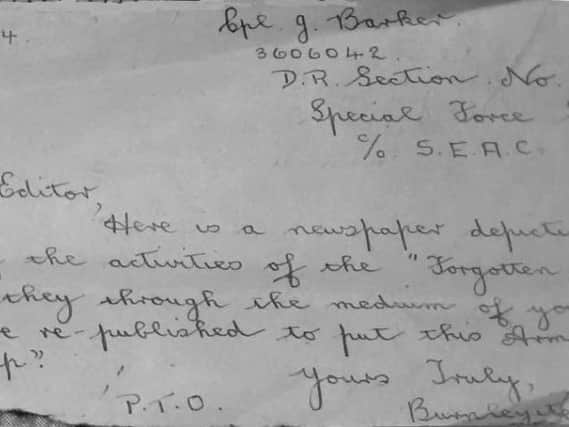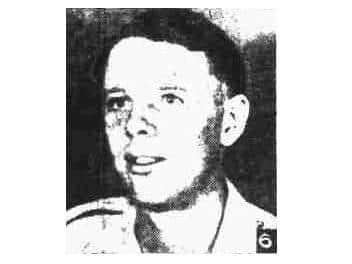A Wartime Souvenir: Forgotten story of Burnley WWII soldier revealed by lost 75-year-old letter


So began a fascinating tale dating back some 75 years.
The envelope was marked number 6594. Prying it open, Anne found a note inside dated November 27th, 1944 and addressed to the then-editor of the Express. It was from a Corporal John Barker. Hand-written on a scrap of brown paper in a beautiful hand, the note was affixed to a fully-illustrated special edition of the Souvenir, the South East Asia Command services' newspaper.
Born in Burnley, Corporal Barker had sent the note and the newspaper to keep the public in his hometown informed on the progress of the 1944 Burma Campaign against the Japanese in World War II. The war in the Far East started in December 1941 with the Japanese bombing of Pearl Harbour, and by June 1942 the Imperial Army had reached the North East frontier of India, engaging British and Indian servicemen in demoralising conflicts in dense jungle terrain.
Advertisement
Hide AdAdvertisement
Hide Ad

A Japanese attempt to invade India was successfully repulsed in 1943 following fierce fighting, and with the formation of the South East Asia Command under Lord Louis Mountbatten, the tide began to turn. Mandalay was retaken in March 1945 and Rangoon followed in May, as the Fourteenth Army - known to many as The Forgotten Army and comprising over one million men, the largest Commonwealth army ever assembled - went on the offensive.
The Japanese surrendered on 15 August 1945, now known as VJ Day.
By happy coincidence, Anne had stumbled across some direct correspondence from the front line just months before the 75th anniversary of VJ Day. Ostensibly never-before-seen material since there is no evidence Corporal Barker's correspondence ever made it into the Express, the note also has other meaningful resonance in contemporary Britain, with Captain Tom Moore - who has raised millions for the NHS during the coronavirus pandemic - himself having served in Burma and India.
John Barker lived on Paper Street in Burnley, worked as a coal drawer in Reedley Colliery, and was a member of the colliery swimming team. He joined up in December 1941, serving with the Royal Corps of Signals as part of the UK Special Forces group known as The Chindits and arrived back in England May 1945. He married his wife Marie in 1946 and the couple had two sons, Lynton and Ian.
Advertisement
Hide AdAdvertisement
Hide Ad